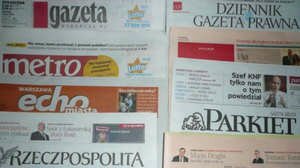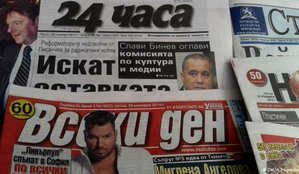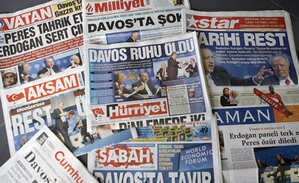
The analysis of the content of print and electronic media of the leading countries and states neighboring Ukraine shows the great attention of foreign audiences to the Ukrainian issues. This situation has become possible first of all due to the consolidated political decision of the EU institutions and the leadership of the USA, Germany, Great Britain, France, Romania, Poland, the Baltic countries and other neighboring countries to support Ukraine in its confrontation with Russia and implementing comprehensive programs to counter the aggressive Russian propaganda.
However, as a result of the new global and regional challenges to the world community and individual states (IS, Syria, Iran, the migration crisis in the EU, the fall in oil prices, the slowdown in the Chinese economy, concerns with the DPRK policy, etc.), extraordinary activity of the Kremlin's propaganda machine, backed by significant financial injections, as well as poor development of Ukrainian IT infrastructure abroad, experts notice the trend for decline in interest to the situation in Ukraine in the autumn of 2015. Moreover, Putin's lobbyists abroad are making efforts to impose their own interpretation of the events and processes in our country, to make the Ukrainian issue look unimportant, and treat it as a component of geopolitical confrontation with the West/USA and to shift the focus from the occupation and annexation of the Crimea and the military opposition in Donbas to news related to corruption and internal political scandals in Ukraine, “impoverishment” of the population, and Ukrainian citizens' protest activity.
In such circumstances, the experts of the Independent Analytical Center for Geopolitical Studies “Borysfen Intel” have tried to make a countrywise analysis of foreign information space in order to let readers themselves define the features of the foreign audience' perception of processes in Ukraine.
 Influential publications of the United States in 2014-2016 have been demonstrating objectivity and disposition to strengthen the political, military and financial support for a democratic Ukraine, as well as clear focusing readers' attention on the key issues — the return of the Crimea, implementation of the Minsk Agreements, the slow pace of implementation of reforms and the need to focus the efforts of the Ukrainian government on anti-corruption and reform programs.
Influential publications of the United States in 2014-2016 have been demonstrating objectivity and disposition to strengthen the political, military and financial support for a democratic Ukraine, as well as clear focusing readers' attention on the key issues — the return of the Crimea, implementation of the Minsk Agreements, the slow pace of implementation of reforms and the need to focus the efforts of the Ukrainian government on anti-corruption and reform programs.
As a result of effective national regulatory and legal tools, and high journalistic standards of influential media, the Kremlin cannot create effective mechanisms of influence on the broader American audience. For example, one of the most effective (as hoped Moscow) channels of bringing the Russian position — TV “RT America” — is not popular at all, and its audience is mainly experts of specialized political science centers and US institutions, as well as anti-globalists and marginal movements/groups.
In promoting pro-American publications in the media space and organizing PR campaigns for the Russian side were also engaged New York companies “5 WPR”, “Squire Patton Boggs” and “PR Newswire”. Among other companies, used by the Kremlin, informed sources mention “Brunswick”, “Hill&Knowlton”, “Weber Shandwick”, “Adams and Reese”, as well as Russian business partners — “ExxonMobil”, “Chevron”, “Cameron International Corporation”, “Goldman Sachs” and some other US banking and financial institutions.
In general, we can speak about a complete failure of the anti-Ukrainian information campaigns in the United States. Perhaps that is why the efforts of the Kremlin and the Russian diplomacy have been focused lately on using American lobbying organizations and PR agencies for “whitening” of Russia's image, as well as resumption of the Russian-American dialogue.
 The focus of the British media in recent months has been shifting to other than Ukrainian, “hot” topics (the terrorist attacks in Europe, the conflicts in the Middle East, the Russian military campaign in Syria, the UK's future in the EU, etc). Because of a certain “fatigue” of the audience in the Ukrainian direction, there is a shift of attention from Russia's aggression against our country to internal processes in our country, critical coverage of the rate of implementation of reforms in Ukraine and the Ukrainian authorities' actions in struggle against corruption, and carrying out judicial reforms.
The focus of the British media in recent months has been shifting to other than Ukrainian, “hot” topics (the terrorist attacks in Europe, the conflicts in the Middle East, the Russian military campaign in Syria, the UK's future in the EU, etc). Because of a certain “fatigue” of the audience in the Ukrainian direction, there is a shift of attention from Russia's aggression against our country to internal processes in our country, critical coverage of the rate of implementation of reforms in Ukraine and the Ukrainian authorities' actions in struggle against corruption, and carrying out judicial reforms.
In the context of the existing insufficiency of quality pro-Ukrainian English-language content that would attract attention of the British audience, the main channels of delivering “messages on Ukraine” are the British-Ukrainian Community led by a close to D. Firtash member of the upper chamber of the British Parliament from the Conservative Party, Lord Risby, and the All-Party Parliamentary Group on Ukraine, headed by a close to Lord Risby member of the lower chamber from the Conservative party, G. Howarth.
The Kremlin's propaganda and anti-Ukrainian rhetoric are present in the British information space and are distributed through a network of Russian public and private media in the country (mainly “Russia Today”, “Sputnik”, “Russia Beyond the Headlines”), which creates a real information threat to the image of Ukraine in Great Britain.
Pro-Russian media actively use the growth of Euroskeptic moods among the population, as well as anti-American marginal political parties that largely receive nourishment from the “Rossotrudnichestvo”'s representation. Besides, additional opportunities for bringing to Western audiences the Russian Orthodox Church's positions on key issues of the present time will be created by the initiatives of the British media manager G. Littler on implementation of the project concerning creation of the international Christian channel. We have no doubt that this proposal will be supported by both Metropolitan Yelisey, the Head of the Sourozh Diocese of the ROC uniting parishes in the UK and Ireland, and the Department for Foreign Church Relations of the Moscow Patriarchate with numerous “oprichniki” from the FSB and Foreign Intelligence Service of the Russian Federation.
 The Russian propaganda's influence on Germany's population is estimated by experts to be insignificant, which fact is determined, in their opinion, by purposeful work of state institutions of Germany and the German media, including to expose methods of work and to refute the “scenes” of pro-Kremlin media. However, the latter continue increasing their activity in matters of imposing on German audience a thought about the fallacy of support for Ukraine's European integration, in discrediting the policy of the EU's sanctions and in promotion of “profitable” to German business projects. To bring these signals, the Russian side involves some loyal experts (A. Rar), politicians (G. Schroeder, representatives of the opposition party “The Left” — S. Wagenknecht, A. Hunko, V. Gerke, eurosceptics from the party “Alternative for Germany”), Russian and German journalists, representatives of business (E. Kordes, R. Lindner).
The Russian propaganda's influence on Germany's population is estimated by experts to be insignificant, which fact is determined, in their opinion, by purposeful work of state institutions of Germany and the German media, including to expose methods of work and to refute the “scenes” of pro-Kremlin media. However, the latter continue increasing their activity in matters of imposing on German audience a thought about the fallacy of support for Ukraine's European integration, in discrediting the policy of the EU's sanctions and in promotion of “profitable” to German business projects. To bring these signals, the Russian side involves some loyal experts (A. Rar), politicians (G. Schroeder, representatives of the opposition party “The Left” — S. Wagenknecht, A. Hunko, V. Gerke, eurosceptics from the party “Alternative for Germany”), Russian and German journalists, representatives of business (E. Kordes, R. Lindner).
 Leading media of France in general have been objectively bringing information about events in Ukraine and the military conflict in the Donbas, allowing the audience to get acquainted with the reporters' chronicle, analytics and a wide range of blog notes. Most news channels in covering the Ukrainian question have been using a professionally-balanced approach, organizing debates, inviting experts, politicians and diplomats.
Leading media of France in general have been objectively bringing information about events in Ukraine and the military conflict in the Donbas, allowing the audience to get acquainted with the reporters' chronicle, analytics and a wide range of blog notes. Most news channels in covering the Ukrainian question have been using a professionally-balanced approach, organizing debates, inviting experts, politicians and diplomats.
At the same time, national TV channels often air the so-called “frontline documentary reports,” filmed directly in the camps of terrorists and Russian mercenaries. At this, as a rule, such reports do not show Ukrainian position. Moreover, more and more often journalists use pro-Russian propaganda stereotypes and clichés, such as the revaluation of the events of the Revolution of Dignity (Canal +), presenting the events in the Donbas as a civil war and internal conflict, with silencing the factor of Russia's aggression.
The information, favorable to the Kremlin, including regarding the ineffectiveness of sanctions pressure, the need to change the official Paris' policy towards the Kremlin and Kyiv, recognition the Crimea as part of the Russian Federation and raising at the European level of the question about the need to turn Ukraine into a federal state are bandied about by the right-wing politicians among the leaders of the French opposition parties (“Republicans”, “National Front” and “Republican People's Union”) and the public movement “Free French”, and pro-Russian experts.
Besides, in the media space of France are being spread “adapted” to the French audience messages with reference to the “historical commonness of French and Russian peoples”, “monarchical and imperial connections”, “continued allied relations of both nations in the struggle against fascism”.
 To a large extent, thanks to the “diligence” of the Kremlin and the Russian propaganda machine, Ukrainian themes do not belong to the priority themes of the Italian media. At the same time, the Russian presence in the national and regional media, online publications, advocacy groups in social networks, on television (the presence of Russian foreign-language channels in the Italian television network), in the business and cultural life of Italy is quite noticeable.
To a large extent, thanks to the “diligence” of the Kremlin and the Russian propaganda machine, Ukrainian themes do not belong to the priority themes of the Italian media. At the same time, the Russian presence in the national and regional media, online publications, advocacy groups in social networks, on television (the presence of Russian foreign-language channels in the Italian television network), in the business and cultural life of Italy is quite noticeable.
Moreover, in support of the strategy of radical European movements as a mechanism to promote its interests in Europe, the Kremlin has firmly “made friends” with the functionaries of the nationalist party “League of the North”, and uses them in the domestic political arena of Ukraine and the European Parliament to promote the idea of lifting the sanctions against Moscow and of indispensability of the coalition with the Russian Federation in the fight against international terrorism, to discredit the Ukrainian side within the framework of solving the situation in the Donbas and in the occupied Crimea.
 With the aggravation of the migratory crisis in Europe and the beginning of the Russian intervention in Syria, Ukrainian topics in the media in Hungary have become less urgent. Frankly anti-Ukrainian theses have been traditionally voiced by bullhorns of the Russian propaganda from among the right-wing party “Jobbik”, who continued to present events in our country only through the prism of the interests of the Transcarpathian Hungarians and their revisionist tendencies, as well as through radical online portals.
With the aggravation of the migratory crisis in Europe and the beginning of the Russian intervention in Syria, Ukrainian topics in the media in Hungary have become less urgent. Frankly anti-Ukrainian theses have been traditionally voiced by bullhorns of the Russian propaganda from among the right-wing party “Jobbik”, who continued to present events in our country only through the prism of the interests of the Transcarpathian Hungarians and their revisionist tendencies, as well as through radical online portals.
Dynamics and tone of coverage of Ukrainian events in the media of Slovakia have a more positive tone for our state. Critical publications about Ukraine are mainly practical (the slowness of reforms, the difficult economic situation, etc.) and do not tend to be overtly propagandistic content. This is explained by the fact that Slovakia clearly complies with the political line of the European Union and avoids as much as possible publication in its media of critical articles about our country.
At the same time, the Russian side has intensified significantly funding and information-propaganda work of its cells, which operate under the guise of cultural centers.
 The “Ukrainian issue” remains among the priority in the information space of Poland, being the subject of daily coverage in the print and electronic media. The key of the materials about Ukraine in the majority of the Polish media is positive. Exceptions are the publications, related to the Polish right-wing radical and nationalist associations that for political purposes are spreading anti-Ukrainian rhetoric, for the most part related to the activities of the UPA.
The “Ukrainian issue” remains among the priority in the information space of Poland, being the subject of daily coverage in the print and electronic media. The key of the materials about Ukraine in the majority of the Polish media is positive. Exceptions are the publications, related to the Polish right-wing radical and nationalist associations that for political purposes are spreading anti-Ukrainian rhetoric, for the most part related to the activities of the UPA.
The Russian Federation and pro-Russian lobby organizations' attempts to use social networks, online publications, TV and radio channels (“RTR Planeta” and the English version of “RussiaToday”) to promote favorable for the Kremlin signals have actually no influence on the Polish society.
The key of covering Ukrainian issues in the information space of Romania is mainly positive or neutral, but the amount of material relating to Ukraine, is decreasing as new urgent issues come to the front. At this, the events in Ukraine are covered in the light of their impact on the European security system, the activities of NATO, political and economic situation in the EU, European integration prospects and so on. The lack of pro-Russian materials in the information space is explained by experts by prevailing of Russophobic moods in “the country, which had been occupied by the Soviet Union”.
 Meanwhile in neighboring Bulgaria, the Kremlin is actively fueling Russophile sentiments in certain parts of Bulgarian society through the involvement of political parties (the Bulgarian Socialist Party, the nationalist party “Ataka”), the use of the Russian Federation's Embassy, funding and control of non-governmental organizations, television channels and publications (“Alfa”, “Blitz”, “Sega”, “Standard”, “Duma”, “Russia Today”, “NewsBG.ru”, etc.), bribed politicians, journalists and experts, as well as increasing pressure on the government of Bulgaria, Bulgarian Orthodox Church, sectors of the economy and energy system.
Meanwhile in neighboring Bulgaria, the Kremlin is actively fueling Russophile sentiments in certain parts of Bulgarian society through the involvement of political parties (the Bulgarian Socialist Party, the nationalist party “Ataka”), the use of the Russian Federation's Embassy, funding and control of non-governmental organizations, television channels and publications (“Alfa”, “Blitz”, “Sega”, “Standard”, “Duma”, “Russia Today”, “NewsBG.ru”, etc.), bribed politicians, journalists and experts, as well as increasing pressure on the government of Bulgaria, Bulgarian Orthodox Church, sectors of the economy and energy system.
 Turkey's media are trying to objectively cover the events in Ukraine and actively use the practice of sending to the place of an event their own correspondents (news agencies Anadolu Agency, Cihan News Agency, and the like). Over the past two years, support for Ukraine in the Turkish society has increased, while our state is clearly perceived as a victim of aggression by the Russian Federation. Besides, the two million Crimean Tatar diaspora in Turkey mainly supports the Mejlis of the Crimean Tatar People and has consistently supported Ukraine's territorial integrity.
Turkey's media are trying to objectively cover the events in Ukraine and actively use the practice of sending to the place of an event their own correspondents (news agencies Anadolu Agency, Cihan News Agency, and the like). Over the past two years, support for Ukraine in the Turkish society has increased, while our state is clearly perceived as a victim of aggression by the Russian Federation. Besides, the two million Crimean Tatar diaspora in Turkey mainly supports the Mejlis of the Crimean Tatar People and has consistently supported Ukraine's territorial integrity.
The vast majority of ordinary citizens in Turkey, especially after the beginning of the Russian Federation's military actions in Syria and aggravation of Turkish-Russian relations, negatively perceive Russia's policy, which significantly raises the threshold of sensitivity of the Turkish population to the Russian propaganda. Therefore the Kremlin's sympathizers' information-propaganda, in terms of forming the official position and public opinion in Turkey, is ineffective.
So, the level of the presence of pro-Ukrainian views and Ukrainian subjects, as well as measures to counter Russian propaganda is quite high in the USA, the UK, Turkey, Poland, Hungary and Slovakia. At the same time, the efficiency of the Ukrainian side's information activity is low in France, Germany, Italy, Spain, Austria, Greece, Bulgaria and other European countries due to the deliberate large-scale and spot activity of Russian and pro-Russian (national) media, political, business and expert bodies to promote the basic message of Putin's propaganda: separation of the “brotherly Ukrainian people” from “the Kyiv authorities, which are under foreign control”, laying the blame for the failure to fulfill the Minsk Agreements solely on the Ukrainian side, positioning of the occupied Crimea as “a historic region of Russia”, “return” of which took place in accordance with international law, accusing the United States of aggressive policy, of double standards and of interfering in the internal affairs of third countries, showing Europeans as “political hostages” of their governments, which “put the loyalty to Washington above their own national interests.”
While not denying the need for rapid development of the Ukrainian news agencies abroad, creating high-quality Ukrainian content for Western (and not only!) media and the establishment of a system of information-image work of foreign diplomatic institutions of Ukraine, we cannot help paraphrasing the “recipe” of the US Ambassador to Ukraine Jeffrey Payette — Ukraine does not need a “Ministry of Truth” to win this hybrid information war. The most powerful refutation of this hybrid war and the Kremlin's information campaign against our country should be successful and modernizing (and not “reformed”) and fighting corruption European democratic Ukraine.

